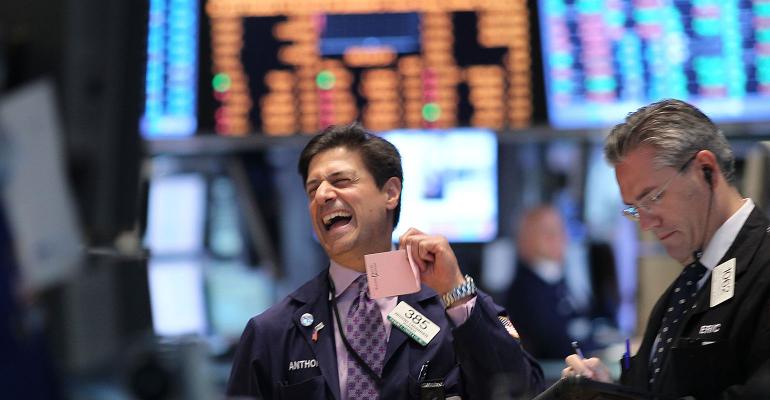(The opinions expressed here are those of the author, a columnist for Reuters)
By James Saft
July 31 (Reuters) - Financial markets are in the grip of something very like a speculative mania, which may well be good reason not to expect a crash soon.
Though bull markets often end when they have reached extremes, they don’t end simply because they’ve reached extremes. An extreme state in a market isn’t predictive of a reversal, only of the likely medium-to-long-term future returns.
The most salient feature of the great jamboree of 2017 isn’t the complaisance of stock market investors, though the much-cited VIX index of stock market volatility, which plumbed never-before-seen lows last week, isn’t the best measure of that. Look instead at the St Louis Fed Financial Stress Index, which comprises a much broader array of measures from bond markets and which today stands at a lifetime low only touched twice before.
By many standards, investors are as fat and happy as they have ever been. The opposite of financial stress is financial bliss, a state of calm and wellbeing which is self-reinforcing.
“Valuation, sentiment and leverage. These are the defining characteristics of a financial mania,” David Rosenberg of Gluskin Sheff writes in a note to clients.
The Shiller price/equities ratio, which compares prices to earnings over a decade, is north of 30, a point it has reached only twice before - in 1929 just before that crash and in the Greenspan-driven bubble between 1997 and 2002, which featured the dotcom mania and its aftermath.
There are even fewer precedents for current valuations on a price-to-revenue basis: only a single week, the March 2000 top, has been at these levels, according to calculations from Hussman Funds.
There are stories that justify these valuations, this time as ever, the most recent being that companies in the U.S. have become more effective, through technology, regulatory hokey-pokey or other means at insulating themselves from competition. In other words a dollar of revenue is more valuable now for the very good reason that the other guy has less of a shot at eating away at it. Believing that is one thing, and I almost do. Buying into it as an equity investor requires not just that it be true, but that it be sustained.
A Case of the Good Feels
Doubting that, and I do, is far different than expecting the rest of the world to wake up sometime soon and join in with the doubters.
For now, investors have a bad case of feeling really good. The Market Vane index of stock bullish consensus, which tracks buy and sell recommendations, is above 70 percent, a level it has touched only a handful of times since 2007, when it began a long leg down that ended in the mid-30s in 2008.
As for Rosenberg’s last mania criteria, leverage, the point is not household debt service costs, which are indeed low, but the kind of leverage and the quality of the projects it is being entered into for. Margin debt has exploded, taking the credit balance for NYSE investors into record negative territory of almost $240 billion as of June, the latest data available.
And plain old margin debt isn’t the whole of the story. The largest brokerages have extended loans of at least $100 billion to clients secured with assets in their accounts, according to the Wall Street Journal, an area of lending which has taken off as the stock market, now in its ninth consecutive up month, has been in a steady and numbing rise.
It may well be that these wealthy clients are using the money, borrowed at low interest rates and secured by their investment, to start clever new businesses, but based on past experience and human nature they are far more likely to be buying Teslas, private jet travel or second homes.
This kind of leverage makes the market vulnerable to a margin call, as a sharp drop, should one ever occur, may prompt forced selling at the worst possible time. This kind of leverage also, at least in the near term, probably makes future near-term gains more likely.
Remember too that all of these stock market gains quite literally force buying from fund managers who are afraid to lag the index lest they be fired. In the age of delegated investment, momentum is extremely powerful.
Fund managers don’t buy the stock market at a Shiller P/E north of 30 because it predicts good future returns, they do it because they fear being left behind.
That will carry on until it doesn’t but there is no particular reason to expect the reversal to come soon. (Editing by James Dalgleish) )






